‘Stop talking about killing Arabs and start talking about saving Jews!’ Hostage relatives and Israeli politicians scream at each other in furious row – as Netanyahu holds stormy meeting with other families
Israeli politicians clashed Monday with the families of hostages held in Gaza in a fierce debate over proposals to extend the death penalty for October 7 perpetrators.
Hen Aviddori, whose wife and daughter were among about 240 people kidnapped by Hamas last month, urged lawmakers at a National Security Committee meeting to “stop talking about killing Arabs and start talking about saving Jews,” amid concerns that a death penalty could impact their relatives still in Gaza.
The outburst prompted a strong response from far-right politician Almog Cohen, who shot back: “You have no mandate for pain – we also buried more than fifty friends.”
Some relatives of hostages have called on Israel’s parliament to halt discussions on new death penalty provisions for terrorists. Gil Dickmann, whose cousin remains trapped in Gaza, wept as he begged committee leaders to drop the hearing altogether.
MK Tzvika Fogel, chair of the Knesset National Security Committee, said anyone who tried to delay the legislation was “representing Hamas” and continued with the meeting to prepare the bill, which lacks cross-party support.
It came as family members met with Israeli Prime Minister Benjamin Netanyahu on Monday evening to discuss the progress of the hostage talks – as Hamas claims a deal is close, but is being held up by Israel.
Families of relatives in Gaza clash with Israeli politicians during a Knesset committee meeting
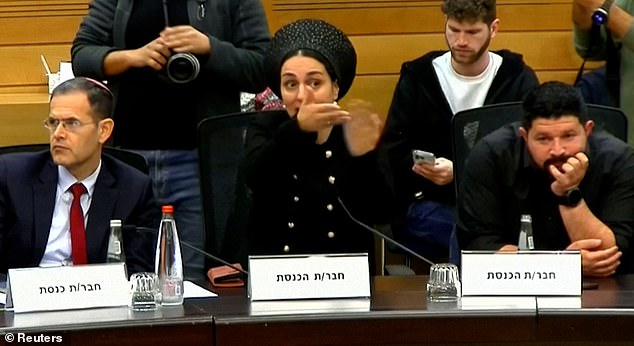
Israeli politicians (Anmog Cohen on the right in the photo) argue for or against the death penalty
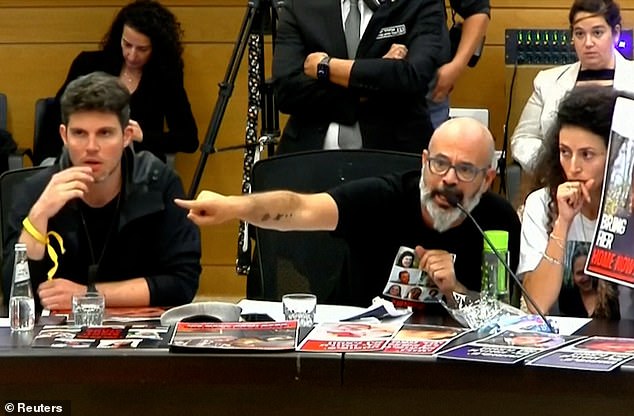
Gil Dickmann (left) watches as Hen Aviddori (center) speaks out against the proposed legislation
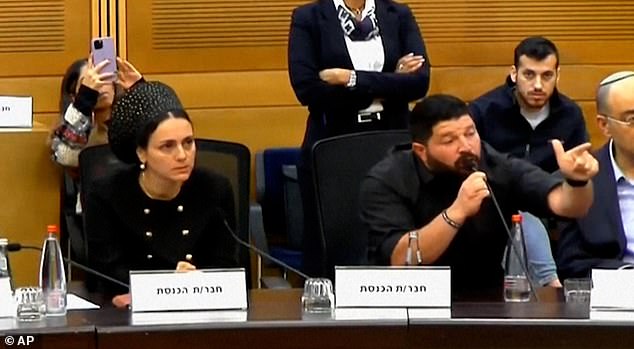
Almog Cohen fires back at family members of Gaza hostages during Monday’s committee hearing
During Monday’s Knesset committee hearing, Speaker Tzvika Fogel called for an expanded death penalty for terrorists and argued against housing Hamas members in Israeli prisons.
“We don’t need to feed these animals,” he said.
He later argued that the death penalty “does not contradict the goal of returning the hostages, and anyone who tries to present this as a contradiction is someone who is trying to represent Hamas more than the State of Israel.”
Others expressed concern that the timing of the proposals could endanger family members still with Hamas in Gaza.
Those present made strong gestures and in some cases stormed out as they voiced their opinions.
Gil Dickmann begged Fogel to “stop” and “not make any trouble of us or our suffering.”
“I’m here in Carmel’s name and to make sure she lives,” he said, referring to his cousin. “Please choose life and make sure they come home alive and in one piece.”
Hen Aviddori, another relative of captured Israelis, stood next to Dickmann and urged lawmakers to reconsider.
It prompted a strong response from MP Almog Cohen, from the far-right Otzma Yehudit party, who said: “My friend is a hostage in Gaza, and by the way, he hasn’t heard from you, my friend.
‘Don’t talk about us wanting to kill Arabs. We weren’t going to kill them on that Shabbat (October 7); they came to kill us.”
Cohen declined to apologize when interviewed later, although he added that he felt it was not the right time to move forward with the proposed legislation.
The death penalty is legal in Israel, but has been imposed only twice in the country’s 75-year history.
Meir Tobianski was executed for treason in June 1948 and posthumously acquitted.
Adolf Eichmann, a key architect of the Holocaust, was hanged in May 1962.
Today, the punishment is reserved for cases of reasonableness, genocide, crimes against humanity and crimes against the Jewish people in wartime – the legacy of the emergency measures inherited from the British Mandate.
But Israel’s current coalition – the most right-wing in the state’s 75-year history – has sought to expand existing laws despite controversy.
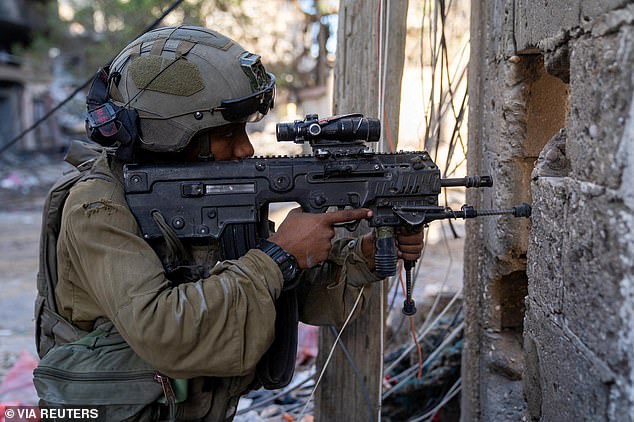
An Israeli soldier takes position in a location identified as Gaza as troops begin a ground invasion of the Strip, as seen in a handout released on November 21.
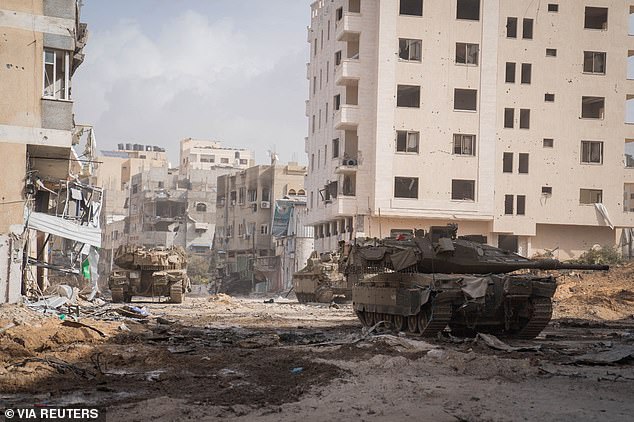
Israeli tanks operate in a location referred to as Gaza in a handout released on November 21
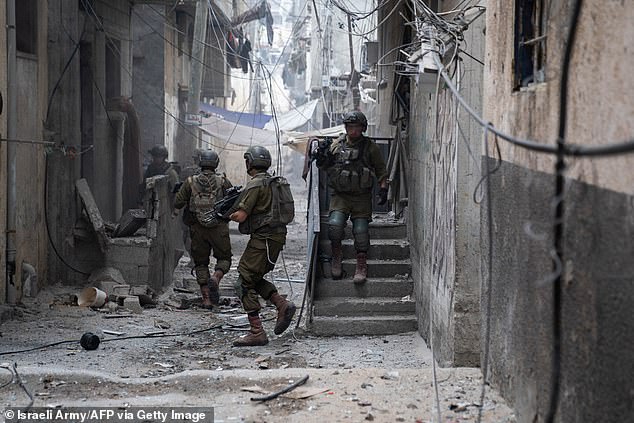
Soldiers during a military operation in the Zeitoun district of the southern part of the Gaza Strip in an image shared on November 20, 2023
Elsewhere, relatives of hostages in Gaza sought an audience with Prime Minister Benjamin Netanyahu to discuss progress in talks over their release.
Hopes are rising that a deal is close after Hamas leader Ismail Haniyeh released a statement suggesting they are ‘close to a deal’ following talks in Qatar – although Israel has remained silent.
But there were chaotic scenes with some being denied entry because there was not enough space in the room reserved for them in the Defense Ministry building in Tel Aviv.
The families said they provided a list of 107 people to the prime minister’s office before the meeting, but when they arrived, some had to wait outside in the cold for more than an hour before all representatives were finally allowed inside.
Several frustrated members left in the middle of the talks, angered by what they said were mixed messages the government had given them about the war’s objectives.
Udi Goren, whose cousin Tal Haimi is being held in Gaza, said: “A few days ago we met with the war cabinet and we heard from them unequivocally that the overarching goal of the war is the return of the hostages.
“But what we heard tonight is that the goal of destroying Hamas is the same as returning the hostages.
‘This angered those present, who feel that this means their loved ones are being allowed to stay in Gaza longer.
“This is incredibly disappointing because we know that taking down Hamas, we keep hearing from them that it’s going to take months or years and it’s going to take a long time.”
Goren also said the war cabinet has not shared details about a possible deal to release the hostages.
The mother of Avinatan Or, 30, said a possible deal that would release only some hostages, namely women and children, would not help her.
Ditza Or said, “What I said inside is that whoever agrees to a partial deal now will kill my son. He won’t see the light of day. There won’t be a second time.’
After the meeting, Mr. Netanyahu emphasized his commitment to securing the release of the hostages, calling it “a sacred and supreme mission.”
In a statement, he added: “We will not give up until they return, and this is the responsibility of me and the War Cabinet.
‘I listened to the pain of the families. We spoke heart to heart. I have shared with them as much as I can about the diplomatic, intelligence and operational efforts we are conducting around the clock.
“We will not stop fighting until we bring our hostages home, destroy Hamas and ensure that there will no longer be a threat from Gaza.”
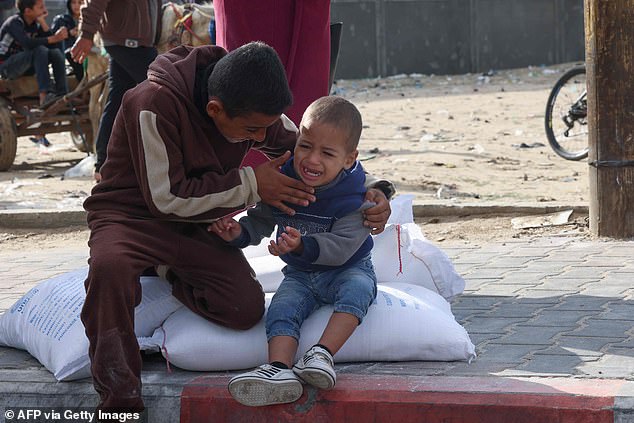
Palestinians receive bags of flour at the United Nations Relief and Works Agency for Palestine Refugees distribution center in the Rafah refugee camp in the Gaza Strip on November 21.
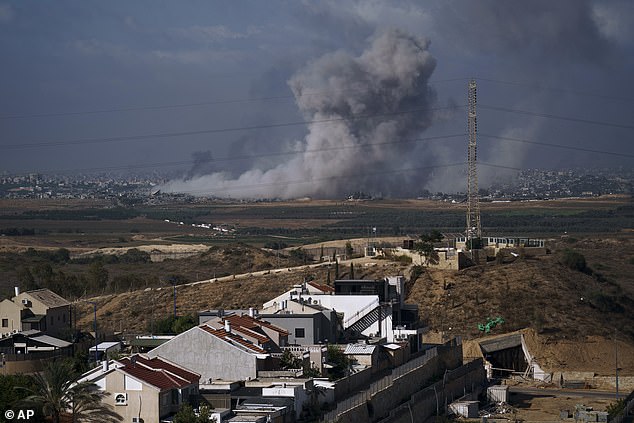
Smoke rises after an Israeli airstrike in the Gaza Strip, seen from the city of Sderot, southern Israel, November 21

Smoke rises over Gaza during retaliatory airstrikes on the Gaza Strip, November 21
Only a handful of hostages have been released so far and there is also anger among families as right-wing members of the Israeli government want to introduce a death penalty for terrorists, which they say endangers the lives of loved ones.
A poll from 2017 found it 69.8 percent of Israelis still supported the death penalty for Palestinians who killed Israelis – despite Israel’s long-standing opposition to its use.
In March 2023, the Knesset approved a bill introducing a mandatory death penalty for those deemed terrorists and removing existing procedural guarantees in military courts.
Broader questions exist among critics about whether the death penalty serves its deterrence purpose.
The Death Penalty Information Center (DPIC), a US-based nonprofit organization that provides data and analysis on capital punishment issues, concludes that the death penalty “is not a proven deterrent to murder.”
